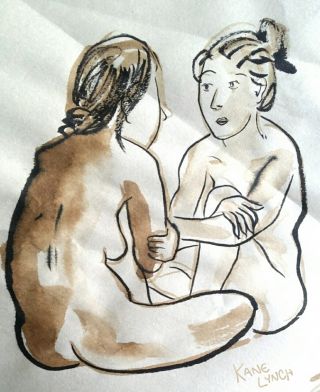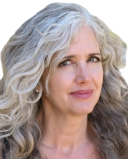Anxiety
Worry About Mammograms, Callbacks, and Biopsies
Anxiety over abnormal mammogram findings and callbacks is quite common.
Posted May 14, 2015


Breast cancer screening and diagnostic procedures can be anxiety provoking, especially for those of us with personal histories of cancer, and those who are high-risk. The official name for this type of worry is "breast cancer screening anxiety."
I’m considered high-risk for breast cancer. I have many risk factors. These include having a high-grade ductal carcinoma in sutu (DCIS; a non-invasive cancer) when I was 32 and having two close relatives who had invasive breast cancer. Indeed, the threat of breast cancer has shadowed me like a tumor on a mammogram. For twenty years, medical professionals have watched me with wary eyes, pokey hands, and privacy-invading technologies. Depending on the year, lumps were felt, MRIed, mammogrammed, ultrasounded, and biopsied. Each time (except for the first), when all was said and done, I was given the “all clear.”
Weary of so much ado about what turned out repeatedly to be nothing, last year I had a breast exam and skipped the mammogram. But this year my doctor was adamant I get a mammogram so I did. A few days later I received the dreaded callback: I would need additional tests. After additional imaging and an ultrasound, two biopsies were recommended, as the findings were “suspicious for cancer.”
I actively work to manage my anxiety during these scares. I have become pretty good at being detached and optimistic. Your life (and death) can flash before your eyes if you’re not careful. This is a waste of perfectly good energy because most of the time, additional tests or surgery find nothing (they call these cases “false-positives”). I can usually manage pesky fears with cognitive behavior techniques. For example, countering fears by reassuring myself that according to research, the odds are still in my favor, or that if it’s something, it’s likely early and treatable. This time however, my anxiety has been particularly intense. It led me to wonder whether enduring years of mammograms, painful procedures, and false-positives were the culprit (though perhaps I should also consider that my aunt died from breast cancer when she was my age).
Ever the researcher, I looked to the literature on anxiety and breast cancer screening. What I found was that abnormal mammography results often create intense short-term anxiety. I also learned that because callbacks and additional testing are common after an initial mammogram, breast cancer screening anxiety is frequent. The more extensive the additional testing, the more anxiety a women is likely to experience. Perceived personal risk is also associated with heightened anxiety. Women who’ve had a prior breast biopsy also generally have greater anxiety after an abnormal mammogram result. (Aha! My anxiety makes sense given I’m high-risk and I’ve already had four biopsies in the other breast! I’m starting to see why someone might have a prophylactic mastectomy!).
I found that according to research, women benefit from minimal delays between screening and the time when definitive results are given, especially those women who perceive themselves to be high risk. I can relate to that too: I had to wait three weeks for my biopsies and managing my anxiety proved more difficult than in times past when waiting times were shorter. I would like to see more radiology professionals adapt their practices to reduce breast cancer screening anxiety, for example, giving scheduling priority for additional procedures to at-risk women.
Unfortunately, breast cancer screening produces many false-positive results so it's not uncommon for women to undergo additional testing and procedures before the “all-clear” is given. According to research, breast cancer screening anxiety is reduced when a woman can easily reach a medical professional whose primary job assignment is to talk to patients about their concerns. And many women experience undue anxiety because they overestimate the likelihood that they’ll receive a cancer diagnosis. Unfortunately, most radiologists provide patients with very little information and it can take a while to get an appointment to speak with your physician, a surgeon, or a therapist. I can see why being able to easily reach someone, like a specially trained nurse, could help.
At the height of my anxiety, I called a community cancer support center. Within a few hours Gloria, the “nurse navigator,” called me back. She was very empathic, listening to my confusion and concerns and assuring me that my upset was understandable. She gave me useful information and she acted toward me with great kindness when I most needed it. I didn’t feel like I was burdening her with my anxiety (a barrier to my sharing my anxiety with friends and family). In my opinion, nurse navigators, or their equivalents (like a medical social worker), should be part of the mammography medical team.
Breast cancer screening anxiety is common and causes suffering, especially for high-risk women. Psychologists need to give it more research attention. We don’t know enough about how it affects future willingness to participate in breast cancer screening, nor how we can best help women and medical professionals manage it. Medical practices need to use what we already know to improve patient care. Individuals need to recognize its existence and provide support to friends and loved ones who following a mammogram, experience the dreaded callback or other breast cancer diagnostic procedures.
2016 Epilogue: I did not have the biopsies after all. After being prepped and given medication which led to an allergic reaction lasting several days, a different radiologist recommended that we adopt a “wait and see” approach, and that I be rescreened in six months. I had suggested such an approach to the first radiologist who reacted as if I was high on skunkweed and insisted the biopsies were imperative. I’m unsure whether I will follow through with additional testing in six months.
2018 Epilogue: I waited until spring 2017 to get a mammogram and due to concerns from a breast cancer expert and radiologists, I had the two biopsies (which were performed by an empathic woman radiologist). The results were negative for cancer. In October of 2017 after receiving many emails from readers experiencing bc screening anxiety, I wrote a blog with suggestions for how to manage it.
References
Brett, J., Bankhead, C., Henderson, B., Watson, E., & Austoker, J. (2005). The psychological impact of mammographic screening. A systematic review. Psycho‐Oncology, 14, 917-938.
Haas, J., Kaplan, C., McMillan, A., & Esserman, L. J. (2001). Does timely assessment affect the anxiety associated with an abnormal mammogram result? Journal of Women's Health & Gender-Based Medicine, 10, 599-605.
Lebel, S., Jakubovits, G., Rosberger, Z., Loiselle, C., Seguin, C., Cornaz, C., & Lisbona, A. (2003). Waiting for a breast biopsy: Psychosocial consequences and coping strategies. Journal of Psychosomatic Research, 55, 437-443.
Smith, R. A., Cokkinides, V., & Brawley, O. W. (2012). Cancer screening in the United States, 2012. CA: A Cancer Journal for Clinicians, 62, 129-142.
Wardle, J., Robb, K., Vernon, S., & Waller, J. (2014). Screening for prevention and early diagnosis of cancer. American Psychologist, 70, 119-129.
Watson, E. K., Henderson, B. J., Brett, J., Bankhead, C., & Austoker, J. (2005). The psychological impact of mammographic screening on women with a family history of breast cancer—a systematic review. Psycho‐Oncology, 14, 939-948.




